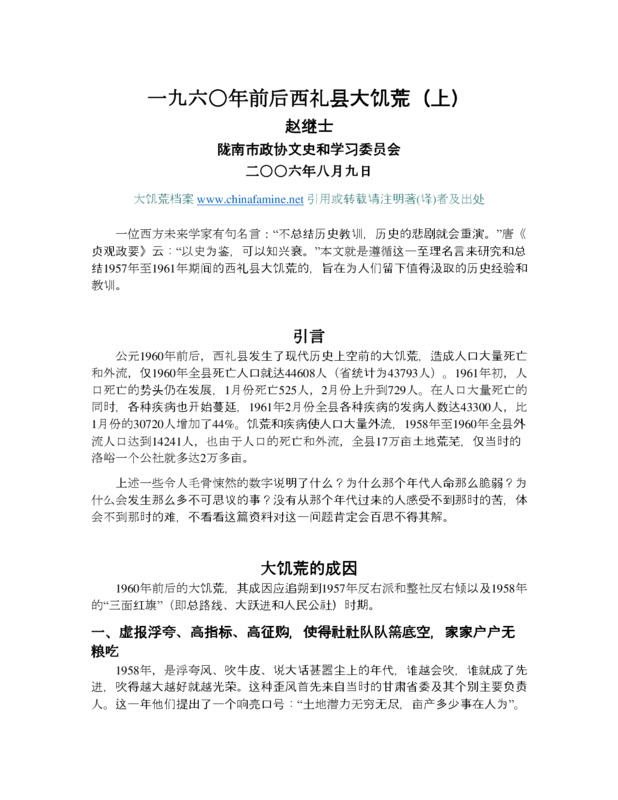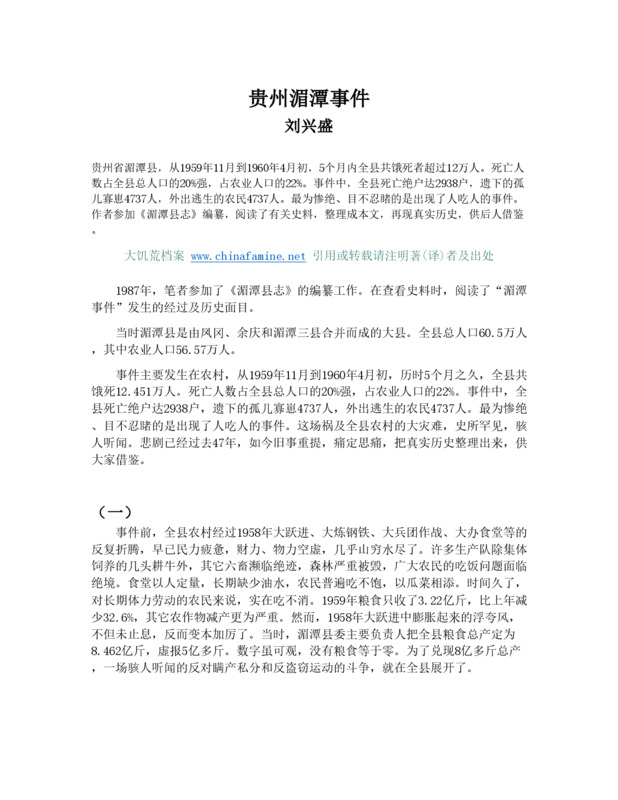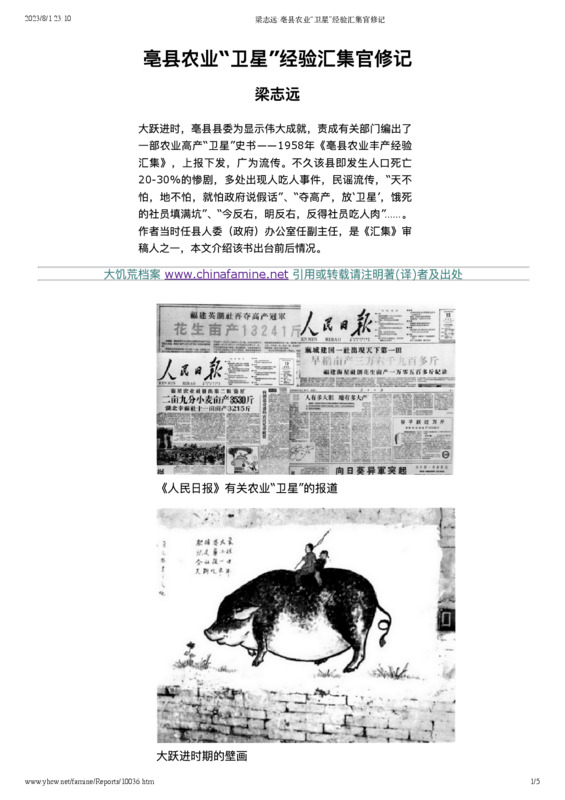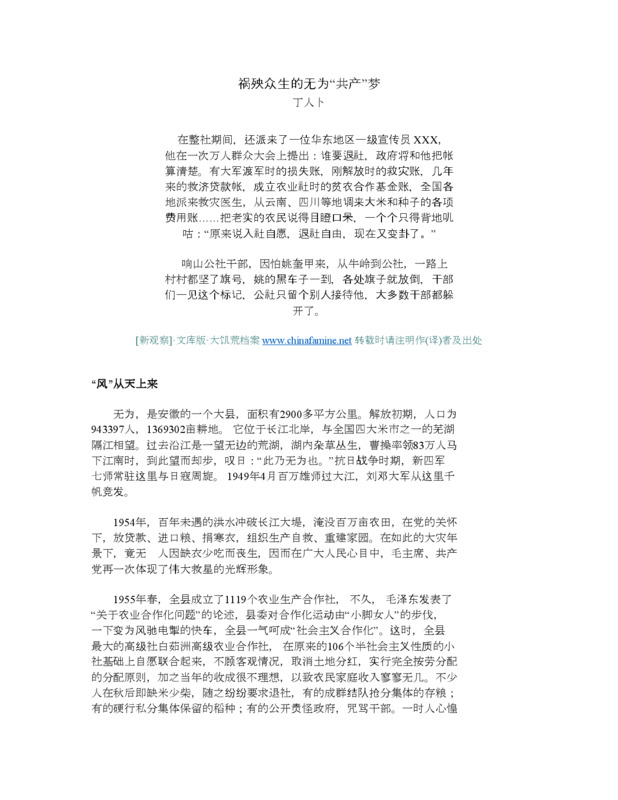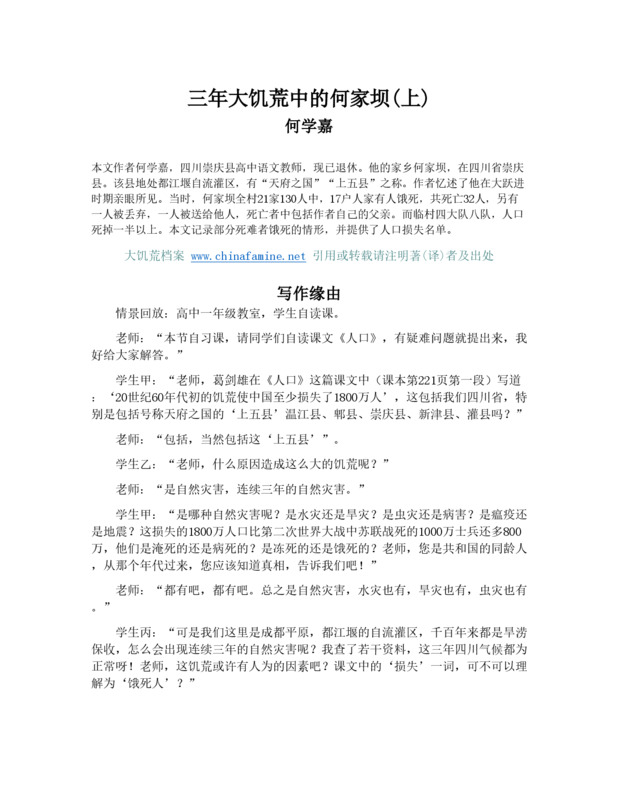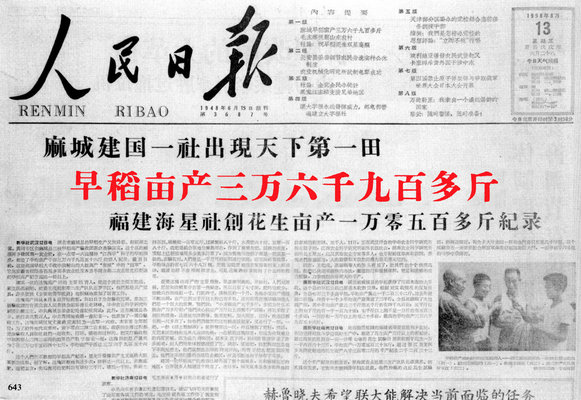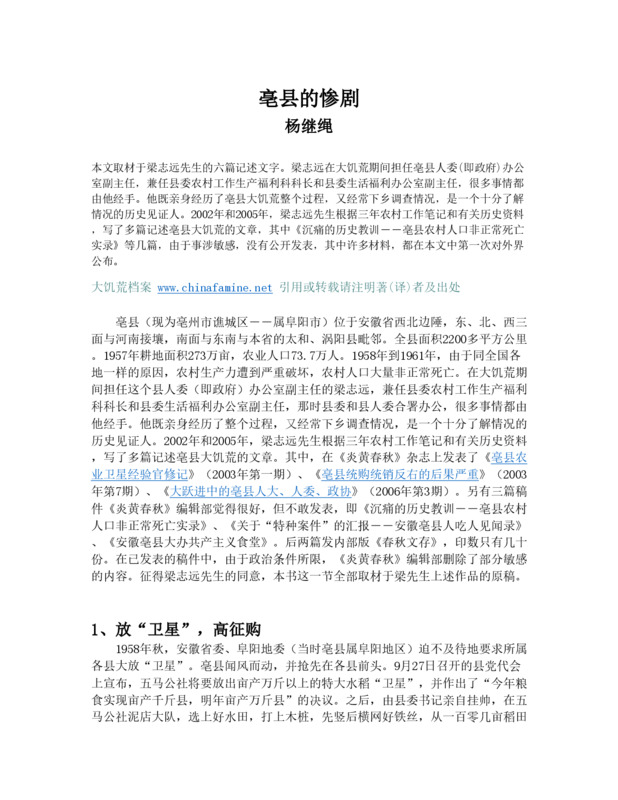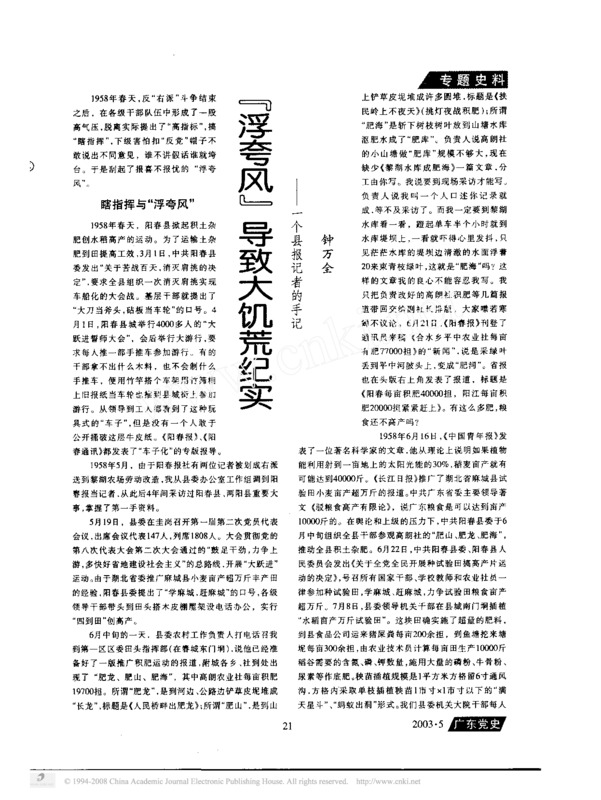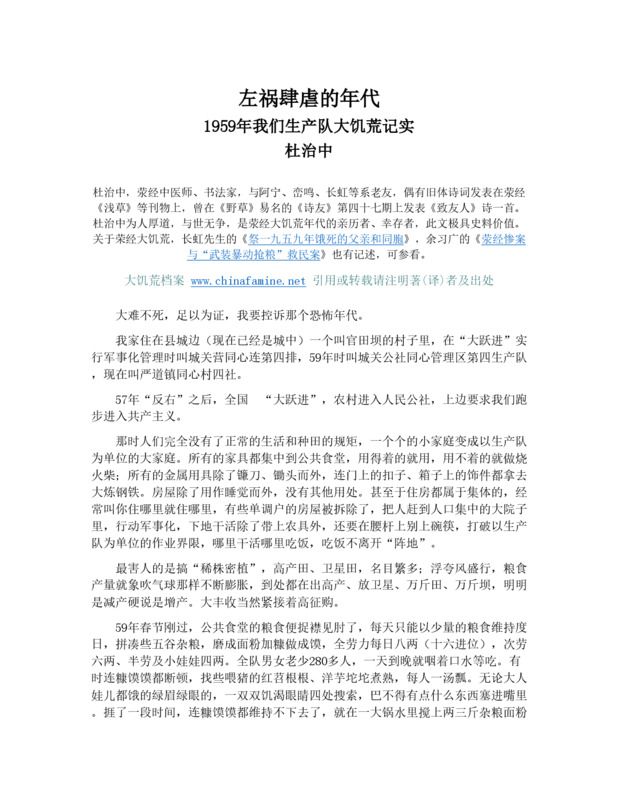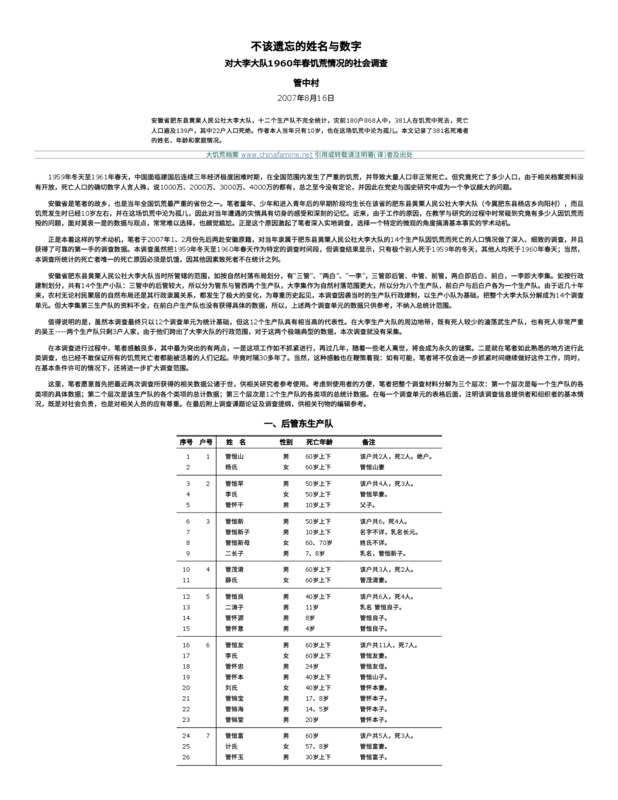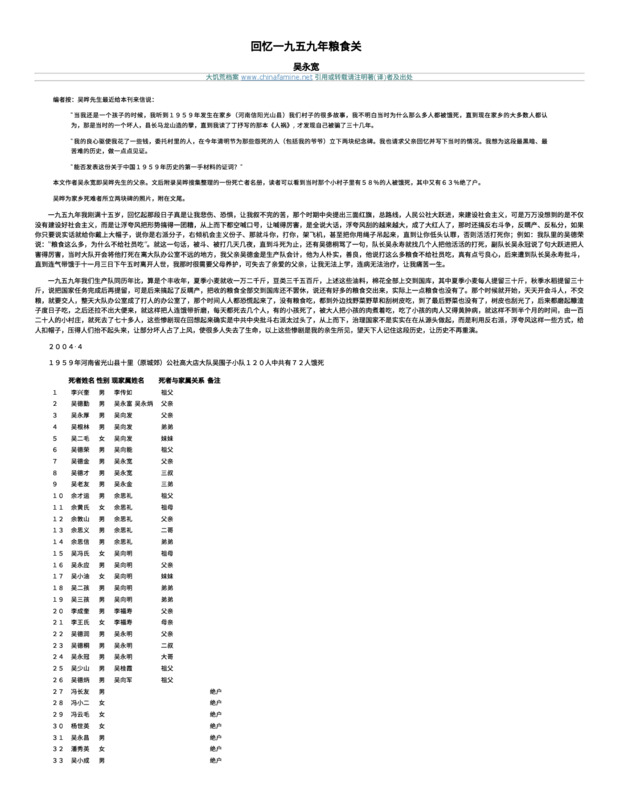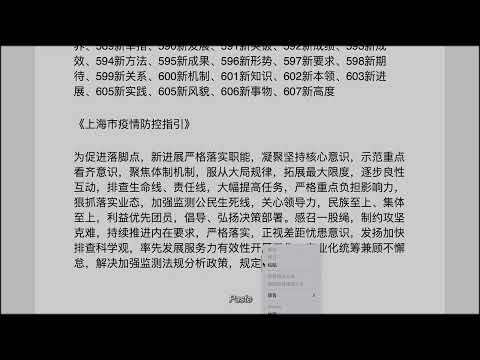Explore the collection
Showing 143 items in the collection
143 items
Article
Special Collections |Famine and Counties (7): The Great Famine in Xili County around 1960
Around 1960, Xili County experienced a famine unprecedented in modern history, resulting in massive population deaths and an exodus, with 44,608 deaths in the county in 1960 alone (43,793 according to provincial statistics). In early 1961, the momentum of population deaths continued to develop, with 525 deaths in January, rising to 729 in February. Along with the massive population deaths, various diseases began to spread. Famine and disease caused a massive exodus of population. From 1958 to 1960 the exodus of population from the county reached 14,241 people. Also due to the death and exodus of population, 170,000 acres of land in the county were left barren, only one commune of Luoyu at that time had more than 20,000 acres.
Article
Special Collections |Famine and County (2): Guizhou Meitan Incident
In Meitan County, Guizhou Province, from November 1959 to early April 1960, more than 120,000 people starved to death in five months. The deaths accounted for more than 20 percent of the county's total population and 22 percent of the agricultural population. During the incident, 2,938 families died in the county, 4,737 orphans and widows were left behind, and 4,737 peasants went out to escape. The most tragic and horrible thing to witness was incidents of cannibalism. The author participated in the compilation of "Meitan County Records," read the relevant historical materials, and organized this article to reproduce the real history for future generations to learn from.
Article
Special Collections |Famine and the county (5): Haoxian agricultural "satellite" experience collection official repair collection
The former Bo County (now Qiaocheng District, Bozhou City) in Anhui Province is located in the plains of northwest Anhui. During the Great Leap Forward in 1958, under the slogan of "how bold people are, how productive the land is," in Bo County, like everywhere else, generally produced agricultural high-yield "satellites." Afterwards, to show the great achievement, the county party committee instructed the relevant departments to compile a high agricultural yield "satellite" history book - 1958, <i>Bo County Agricultural Yield Experience Collection</i>, that was reported to the press and widely circulated. At that time, I served as deputy director of the county people's committee (government) office and was appointed by the county party committee as one of the reviewers. Now I would like to introduce the incredible circumstances for future generations with the the introduction of the history book *Collection*.
Article
Special collections |Famine and the County (6): The "Communist" Dream of Doing Nothing that Wreaks Havoc on the People
During the period of reorganization of the commune, a first-class propagandist from East China was sent to the commune. At a mass meeting of 10,000 people, he proposed that whoever wanted to withdraw from the society, the government would settle accounts with him. There was an account of the losses incurred when the army crossed the border; an account of the disaster relief during the past few years, an account of the poor-peasant cooperative fund when the Agricultural Society was established; and the accounts of the various expenses incurred in sending disaster relief doctors from all over the country and transferring rice and seeds from Yunnan and Sichuan ...... The honest peasants were dumbfounded. Each one privately complained: "The original said that membership was voluntary and withdrawal was free, but now they have changed their minds."
Article
Special Collections |Famine and Village (1) Hejiaba in the Three-Year Famine
At the time of its writing, the author of this article, He Xuejia, was a retired high school language teacher in Chongqing County, Sichuan Province. His hometown, Hejiaba, is in Chongqing County, Sichuan Province. The county is located in the Dujiangyan Artesian Irrigation District and is known as the "Land of Heavenly Capital" and the "Upper Five Counties." The author recalls what he witnessed during the Great Leap Forward. At that time, Hejiaba village had 21 families of 130 people. 17 families starved to death, a total of 32 deaths, another person was abandoned, one was given to others, the deaths include the author's own father. As for the four major teams and eight teams in the adjacent village, more than half of the population died. This paper documents some of the deaths from starvation and provides a list of population losses.
Article
Special Collections|Famine and Village (2) The People's Commune Canteen in Zhoujiawan
"In the second month of the 1961 lunar calendar, the communal canteen was disbanded. The houses and pigsties of the members were compensated and returned. The land was set aside, and the rations were supplied. So we gradually got through the difficult times. Some said that if the communal canteens had been organized for a few more years, I wonder how many more people would have died. "This is the personal experience and oral account of a farmer in Yingshan County, Sichuan Province.
Article
Special Feature|Famine and County (3): Hao County's Tragedy
This article is taken from six accounts by Mr. Liang Zhiyuan. Mr. Liang Zhiyuan was the deputy director of the Bo County People's Committee (i.e., the government) office during the Great Famine. He also served as the head of the Production and Welfare Section of the County Party Committee's Rural Work Department and the deputy director of the County Party Committee's Living and Welfare Office, where he was responsible for a lot of things. In 2002 and 2005, based on three years of rural work notes and relevant historical information, Mr. Liang Zhiyuan wrote a number of articles describing the Bo County famine, including "A Painful Lesson in History - The Unnatural Deaths of the Rural Population in Bo County." and several other articles. Due to the sensitivity of the matter, these have not been published publicly, and many of these materials are released to the outside world for the first time in this article.
Article
Special Features|Famine and the County (4): Chronicle of the Great Famine caused by pompous winds
Guangdong Liangyang County was formed in 1958 by the merger of Yangjiang and Yangchun counties. This article describes the ins and outs of excess and famine in Liangyang County.
Article
Specials Collections| Famine and the Village (4) The Year of the Raging Left Scourge
The author of this article, whose hometown is the fourth team of Guantianba in Sichuan Province, experienced the Great Famine and witnessed one of his fellow villagers die of starvation. He records how people struggled to survive the famine and records each of the names of those who died of starvation in the hope that future generations will always remember them.
Article
Specials Collections| Famine and Village (4) Names and Numbers That Should Not Be Forgotten
Dali Brigade of Huangli People's Commune, Feidong County, Anhui Province, has twelve production teams. According to incomplete statistics, of the 868 people in 180 households before the disaster, 381 people died in the famine, and the death population spread over 139 households, of which 22 households were entirely annihilated. The author, Guan Zhongcun, who was only 10 years old at the time, was also orphaned during the famine. This article records the names, ages, and families of the 381 people who died.
Article
Specials Collections| Famine and Village (6) Memories of the 1959 Grain Shutdown
In 1959, out of 120 people in Wu Weizi Squad of Gao Dadian Brigade, Shili Commune, Guangshan County, Henan Province, 72 people died of starvation. Author Wu Yongkuan witnessed the deaths of his father and his fellow villagers. His son, Wu Ye, collected and organized a list of the dead, and readers can see that, at that time, 58% of the people in that small village died of starvation, and 63% of families died off with no descendants.
Film and Video
Taishi Village
In the fall of 2005, residents of Taishi Village became increasingly frustrated and angered by the sale of land by village officials; hundreds of villagers signed a petition calling for the removal of the village chief. The villagers occupied the village committee’s financial office and expressed their demands through sit-ins and other forms of protests. The government dispatched the police to arrest village activists, but the villagers insisted on starting a formal recall process. The government finally sent a team to the village to verify the signatures for the petition.
<i>The Taishi Village</i> recall incident generated attention from Chinese and foreign media, and caused uneasiness among local government officials. On September 12, 2005, police arrested dozens of villagers who were participating in a sit-in in the village committee room. Despite the pressure, villagers elected a committee to remove the village committee director. The government then dispatched more men to exert pressure, forcing elected members to withdraw one by one. Hired patrol teams eventually drove lawyers and reporters out of the village.
This documentary records the protest scenes and tragic ending of Taishi village’s movement for autonomy, and presents the surging rights consciousness in rural areas in Guangdong. This incident demonstrates villagers’ ability to exercise their right to vote and the government’s inertial approach to grassroots democracy movements.
This documentary is in Chinese with Chinese subtitles.
Film and Video
The Central Plains
Due to poverty in rural areas in Henan Province—part of China’s Central Plains—many farmers contracted AIDS by selling their blood. This documentary dives into the lives of these AIDS patients, depicting the manner in which they cope with life, officials’ responses, and the stories of volunteers who helped the infected villagers. The filmmaker visited several villages with high incidence of AIDS, interviewing and recording people’s accounts of how the “plasma economy” arose. This documentary presents the living condition of families and individuals, especially women and children, who contracted AIDS due to blood donation and blood transfusions, and demonstrates the formation of grassroots organizations.
This film is in Chinese with both Chinese and English subtitles.
Book
The Collected Works of He Jiadong
He Jiadong is a Chinese publisher. He joined the Chinese Communist Party at an early age. After 1949, he founded the Workers' Publishing House, one of the propaganda mouthpieces of the CCP. In 1957, he was designated as a rightist and later labeled as an anti-Party element. In 1965, Kang Sheng criticized him. He was sent down to Chengwu County in Shandong Province, where he was put under local control for 14 years. During the Cultural Revolution, he was taken back to Beijing and criticized, which affected his family and led to the unnatural death of his mother and two sons. In 1979, after the rightist was corrected and completely rehabilitated, he became the executive vice-president and deputy editor-in-chief of the Workers' Publishing House; in 1983, he founded the monthly <i>Rensheng (Life)</i>. In 1984, he founded <i>Kaituo (Pioneering)</i> magazine. He was investigated for publishing Liu Binyan's <i>The Second Kind of Loyalty</i>, and resigned from his post in 1985. The above weekly newspapers, bimonthly magazines and websites were all suspended and closed by the authorities. He has written a large number of articles exploring China's development path from the end of authoritarianism to constitutional democracy. He himself had a 60-year career as a "red publisher" but never had the freedom to publish. Even his own collection of essays was never published. Until the end of his life, he never saw a printed volume of his essays—the printed books were seized and confiscated by the Chinese authorities.
The book can be purchased <a href="https://www.fellowspress.com/shop1/p/-4"> link</a>.
Book
The Great Leap Forward: An Intimate Memoir
Li Rui, who once served as Mao's secretary, is also an expert on Mao Zedong. Like his famous <i>Proceedings of the Lushan Conference</i>, this book is also an important historical work. It focuses on the author's personal experience of the Great Leap Forward initiated by Mao Zedong.
Film and Video
The Memo
In the spring of 2022, a wave of COVID-19 exploded in Shanghai. Under the policy of “Zero COVID,” 24 million residents were put under forced lockdown. Filmmakers and reporters used their phones, televisions, the internet, and other materials to capture scenes of lockdown and disputes between officials and civilians in Shanghai. Producers of this short film titled <i>The Memo</i> believe that it is necessary to record this historic episode in order to prevent our memories from fading away.
The production team, which was founded in 2020, strives to create works about the lower classes of Chinese society. <i>The Memo</i> was nominated for the Clermont-Féron Short Film Festival.
Book
The Power of Tiananmen:State-Society Relations and the 1989 Beijing Student Movement
<i>The Power of Tiananmen: State-Society Relations and the 1989 Beijing Student Movement</i> is a sociological monograph. It explains the process of the 1989 school movement and interprets the political and economic situation from four perspectives: state legitimacy, ecological environment and mobilization structure, discourse and modes of action, and public opinion. Author Zhao Dingxin interviewed 70 participants in the movement at the time. He also examined many little-known domestic documents. Thus, theory and evidence are closely intertwined.
The book won the 2002 Distinguished Book Award (Collective Action/Social Movements) and the 2001 Distinguished Book Award (Asian and Asian American) from the American Sociological Association.
It is published by the Chinese University of Hong Kong Press.
Film and Video
The Vagina Monologues -- Stories Behind the Scenes
<i>The Vagina Monologues</i> is a pioneering feminist drama created by the American playwright Eva Ensler. In 2003, teachers and students at the Gender Education Forum of Sun Yat-sen University in China adapted the play and added artistic interpretations of Chinese women's gender experience. The adapted play had its first performance at the Guangdong Provincial Art Museum. This documentary records the attitudes of governments across China towards the play as well as women's perceptions of the play and its connection with their personal experiences. It also highlights the current political and cultural ecology of China.
Book
Thirty Years of New China
Tang Degang is a historian and biographer who specializes in oral history. In the latter half of his life, he settled in the United States and taught at Columbia University and the City University of New York. In the field of history, he put forward the "Three Gorges Theory of History", which divides the change of Chinese social system into three major stages: feudalism, imperialism, and civil rule. The book was originally titled <i>Mao Zedong's Dictatorship, 1949~1976</i>, but was renamed <i>Thirty Years of New China </i> when it was released on the mainland.
